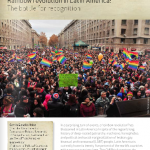Andrea Castagnola and César Augusto Valderrama (2015)
Bogotá: Universidad de los Andes, Facultad de Derecho, Ediciones Uniandes; Mexico: FLACSO
Andrea Castagnola has together with César Augusto Valderrama published an article on internally displaced persons in Colombia in the newly published book Los Derechos Humanos y la Violencia: Estado, Instituciones y sociedad civil (Human Rights and Violence: The State, Institutions and Civil Society). Official records shows that until 2011 about 7.3% of the population in Colombia has […]
Camila Gianella Malca and Bruce Wilson (2015)
Bergen: Chr. Michelsen Institute (CMI Brief vol. 14 no. 1) 4 p.
In a surprising turn of events, a “rainbow revolution” has blossomed in Latin America. In spite of the region’s long history of deep-rooted patriarchy, machismo, homophobia, and political and social marginalization of lesbian, gay, bisexual, and transsexual (LGBT) people, Latin America is currently home to twenty five percent of the world’s countries with same sex […]
Marit Skivenes (UiB) and Anne-Mette Magnussen (HiB) (2015)
International Journal of Children's Rights
Marit Skivenes has together with Anne-Mette Magnussen published an article on “The Child’s Opinion and Position in Care Order Proceedings: An Analysis of Judicial Discretion in the County Boards’ Decision-Making” in the International Journal of Children’s Rights. This paper examines whether, and in what way, the child participates in care order decisions heard by the […]
Elin Skaar, Camila Gianella Malca, Trine Eide (2015)
London: Routledge (Transitional Justice Series)
This book examines the effects of transitional justice on the development of peace and democracy. Anticipated contributions of transitional justice mechanisms are commonly stated in universal terms, with little regard for historically specific contexts. Yet a truth commission, for example, will not have the same function in a society torn by long-term civil war or genocide […]
Torunn Wimpelmann (2015)
Women's Studies International Forum
This article by Torunn Wimpelmann (CMI) offers some reflections on the efforts over the last decade to combat violence against women in Afghanistan through reforms of laws and the justice system. The paper identifies two intersecting factors that have curtailed the transformative impact of these efforts. Firstly, law-making and legal practices have become infused with […]
Kalle Moene and Tina Søreide (2015)
Draft paper for Susan Rose-Ackerman and Paul Lagunes (Eds). 2015. Greed, Corruption, and the Modern State Essays in Political Economy, Edw. Elgar Publishing
Fashions come and go in the development community. When a policy idea becomes popular, some governments implement a cosmetic variant of the policy. What looks like development, are institutional façades; pretty from the outside, ugly from the inside. A good governance façade can be introduced deliberately to mislead observers and stakeholders to cover political theft. […]
Andrea Castagnola and Aníbal Pérez-Liñán (2015)
British Journal of Political Science
Andrea Castagnola has together with Aníbal Pérez-Liñán published an article on Judicial Instability and Endogenous Constitutional Change in Latin America.
Rachel Sieder y John-Andrew McNeish (2014)
Mexico City: Publicaciones de la Casa Chata 292 p.
Gender Justice and Legal Pluralities: Latin American and African Perspectives examines the relationship between legal pluralities and the prospects for greater gender justice in developing countries. Rather than asking whether legal pluralities are ‘good’ or ‘bad’ for women, the starting point of this volume is that legal pluralities are a social fact. Adopting a more […]
Camila Gianella-Malca, Siri Gloppen (2014)
Bergen: Chr. Michelsen Institute (CMI Brief vol. 13 no. 1) 4 p.
Millions of Latin American women face serious barriers to their sexual and reproductive rights, and they suffer serious consequences as a result. Latin American countries maintain restrictive abortion laws in spite of social developments like economic growth, democratically elected governments, formal adoption of liberal constitutions and ideologies.
Elin Skaar, Åse Johanne Roti Dahl (2014)
Bergen: Chr. Michelsen Institute (CMI Brief vol. 11 no. 5) 4 p.
This brief assesses the impact of transitional justice mechanisms on peace and democracy. Based on four case studies from Africa and Latin America, it argues that the expected positive effects of transitional justice may be too high. Transitional justice processes are complex and dynamic and may change substantially over time. The distinction between short term […]

